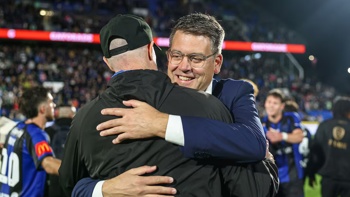Almost $6 million in Budget 2023 will go towards providing additional security for politicians and their staff amid increasing requests for more protection at public events and at their homes.
The funding, spread over four years, comes after Finance Minister Grant Robertson last year referenced the more intense threats he was receiving and how it emphasised the risk posed to politicians by the upcoming election.
The Herald reported yesterday a total of $14m over four years would be used for security measures and MP support staff.
Parliamentary Service chief executive Rafael Gonzalez-Montero said in a statement about $5.7m would go towards enhancing security measures for MPs and their staff.
“This funding can also be used to provide additional security assistance for members engaging with their constituents at public or community events and also their home residence or Wellington accommodation,” he said.
“There has been an increase in requests for these services in the past year.”
/cloudfront-ap-southeast-2.images.arcpublishing.com/nzme/323UHFFJYTS5WG7J5MX54RIHAU.jpg) Parliamentary Service chief executive Rafael Gonzalez-Montero said there had been an increase in requests by MPs for security. Photo / Mark Mitchell
Parliamentary Service chief executive Rafael Gonzalez-Montero said there had been an increase in requests by MPs for security. Photo / Mark Mitchell
Some of the funding would also be used to increase security staff on Parliament grounds.
“This will allow us to be able to increase staff numbers quickly when necessary as well as offer security assistance at members’ offices around the country,” Gonzalez-Montero said.
Robertson, speaking to the Herald after he presented the Budget yesterday, said the safety of MPs was an “emerging problem”.
- National stands by promise to re-introduce $5 prescription fee scrapped in Budget
- Associate Minister of Finance on how the Budget deals with inflation
- Finance Minister: Govt spending more than it planned to in Budget because of Gabrielle
“Security is an issue for all MPs and we need to make sure people can be safe doing their jobs,” he said.
In an interview with the Herald in September last year, then-Deputy Prime Minister Robertson said thought had to be given to keeping MPs safe in the upcoming election campaign after an escalation in threats and abuse of MPs, including himself.
“We are heading into an election campaign that will be undertaken in an atmosphere that is different from the ones I’ve done before,” he said.
“When I travel around New Zealand now, I come across people who are yelling threats and abuse at me in such a way that I now have to think about whether I have DPS with me.”
The Diplomatic Protection Squad police accompany the Prime Minister as a matter of course, but also follow the Opposition leader on some occasions, including during the election campaign and at Waitangi, where politicians had been targeted before.
/cloudfront-ap-southeast-2.images.arcpublishing.com/nzme/NE4W6ZBO5ZF5PIHNAD67J74INM.jpg) The Parliament occupation showed the anti-political sentiment in New Zealand. Photo / Mark Mitchell
The Parliament occupation showed the anti-political sentiment in New Zealand. Photo / Mark Mitchell
Otherwise, their services were used only when a situation was considered dangerous or there were concerning threats around a specific politician.
Robertson had said this year’s campaign would be challenging.
He referred to a July incident in Whangārei, in which he left by the back door of a venue to avoid about a dozen anti-mandate protesters and those opposing the closure of the Marsden Pt oil refinery blocked the way to his car, one bearing a large lamington she said was to throw at him.
He’d had DPS with him on that occasion because of Facebook posts suggesting his visit would be protested.
“I felt safe with them with me. But we can’t do that for every MP. I think we are going to have to think about this election campaign in a slightly different way. We can’t let them win, so we’re going to have to think about how we do it differently.”
In May last year, National Party leader Christopher Luxon was kept inside a venue in Palmerston North until police arrived.
Luxon told the Herald in September he felt “pretty safe” as he moved around the country, but care had to be taken to try to avoid division.
“We can disagree without being disagreeable, but we need to maintain civility because once you have division in a country, it’s very hard to zip it back up together again.
“It’s actually one of the great things about New Zealand that we are highly accessible as politicians to the public. We do not want to see, as we see in many other countries, that as politicians we are not available to the public.”
His deputy leader Nicola Willis also said she had felt fairly safe to date. People disagreed with her sometimes, but that was part of an open democracy. On whether her gender was a factor in some of the reactions she experienced, she said “sometimes some of the comments I get online men wouldn’t get”.
Labour MP Tamati Coffey said he had to take his name and branding off his car after it was targeted.
“I’ve had my car scratched, I’ve had people yell at me and abuse me in my branded car. I’ve taken my name off my car because of some of the abuse I’ve had.”
Green Party co-leader Marama Davidson said she had noticed a more “violent nature” to threats. Fellow co-leader James Shaw had his eye socket broken in a 2019 attack by a 47-year-old man, who was jailed as a result of the attack.
Take your Radio, Podcasts and Music with you









